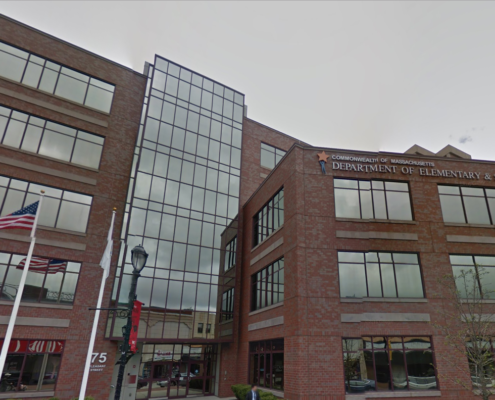
MBTAAnalysis: A look inside the MBTA
0 Comments
/
The MBTA shuttles over a million passengers a day around Greater…
 https://pioneerinstitute.org/wp-content/uploads/CloseupClock-1.jpg
739
1244
Mary Connaughton
https://pioneerinstitute.org/wp-content/uploads/logo_440x96.png
Mary Connaughton2017-02-20 12:34:192017-02-21 09:47:58The Clock is Ticking…….
https://pioneerinstitute.org/wp-content/uploads/CloseupClock-1.jpg
739
1244
Mary Connaughton
https://pioneerinstitute.org/wp-content/uploads/logo_440x96.png
Mary Connaughton2017-02-20 12:34:192017-02-21 09:47:58The Clock is Ticking…….
Charter School Caps and Strings Attached
This white paper attempts to fill that void and outline the pros and cons of the new legislation. It does so by taking a close look at the language of the law, the conditions attached to the charter school cap raise, and the recent politics of charter schooling in the state.

Review of Common Core Math Standards: Testimony to the California Academic Content Standards Commission
Testimony to the California Academic Content Standards Commission provided in July 2010.

National Standards Still Don’t Make the Grade
The case for national standards rests in part on the need to remedy the inconsistent purposes and inferior quality of many state standards and tests in order to equalize academic expectations for all students. The argument also addresses the urgent need to increase academic achievement for all students.

The Emperor’s New Clothes
The academic and economic implications of Common Core's definition of college and career readiness standards in ELA and mathematics should be receiving extensive examination by every local and state school board in the country, by editorial boards in all major media, and by the U.S. Congress before cash-strapped states are coerced by the USED's criteria for RttT funds, membership in test consortia, or Title I funds into committing themselves to Common Core's standards. That they have not is perhaps the most serious matter of all.

Fair to Middling: A National Standards Progress Report
The purpose of this April 2010 progress report is to indicate how Common Core's March drafts have addressed the deficiencies and limitations in its September and January drafts, and to spell out major areas needing further work. The analysis we present in this progress report shows that, although progress has been made, considerably more work is needed, particularly at the secondary level, to enable Common Core's mathematics and English language arts (ELA) standards to be internationally benchmarked and to serve as the basis for valid and reliable high school exit level assessments.

Beyond Demographic Destiny
This report analyzes achievement gaps for African-American and Hispanic minority students in selected Massachusetts school districts. It examines the gaps in English Language Arts and Mathematics achievement on the state assessment, MCAS, between each minority group and White students.

Writing Instruction in Massachusetts
This new Pioneer Institute policy brief on student writing in our schools will be helpful if it highlights the understanding that students will need to write often and at length in college and beyond.

Why Race to the Middle?
In short, the rush to move from 50 state standards to a single set of standards for 50 states in less than one year, as well as the lack of transparency in CCSSI’s procedures, have excluded the kind and extent of public discussion merited by the huge policy implications of such a move.

Lowering the Bar to Get a Passing Grade
Southern New England School of Law (SNESL) is a regionally accredited law school located in North Dartmouth, Massachusetts. It was founded in 1981 and unsuccessfully sought American Bar Association (ABA) accreditation in 1997 and again in 1999.

Debunking the Myths About Charter Public Schools
Charter public schools have existed in Massachusetts since 1995, after enabling legislation was included in the landmark Massachusetts Education Reform Act (MERA) of 1993. Originally conceived as laboratories for educational innovation that could offer choice for families and competition for traditional district schools, charters are public schools that may not discriminate as to whom they accept.

Putting Children First: The History of Charter Public Schools in Massachusetts
The story of charter schooling in Massachusetts is, by and large, the story of an idea that took hold at the local level and was quickly adopted by legislators who saw charter schools as one key to addressing devastating problems with the state's urban school districts. It is also the story of diverse groups of constituents—politicians, businesspeople, parents, and concerned citizens—coming together to create innovative schooling options for the Massachusetts students that need them most.

Follow the Money: Charter School and District Funding in Massachusetts
Charter public schools operate under five-year charters from the Massachusetts Board of Elementary and Secondary Education (BESE) and are not part of traditional local school districts. Charters often organize around a core mission, curriculum, or teaching method. They are free from district management and local collective bargaining agreements, and they control their own budget and hire teachers and staff separately from the local school district.

Closing Springfield’s Achievement Gap
Business leaders, educators, policy makers, and civil rights advocates are increasingly dedicated to fundamental reform to close the achievement gap that limits hope and opportunity for students from historically disadvantaged groups. Substantial gaps in academic achievement between groups of students based on race, ethnicity and similar factors should have no place in American society in the 21st century.

School-Based Management
Located in the “bicep of Cape Cod,” the Town of Barnstable, Massachusetts, is widely considered that area’s economic and municipal hub. Home to a thriving business sector, healthcare facilities, an airport, and a host of other municipal services, many of Cape Cod’s citizens rely upon Barnstable and its seven surrounding villages for economic and cultural prosperity.

Why MTEL, Not PRAXIS, Will Maintain Teacher Quality
The tests Massachusetts uses for licensing teachers, the Massachusetts Tests for Educator Licensure (MTEL), have been developed for the state by the Evaluation Systems group of Pearson (ESP) under continuously renewed contracts with the Department of Elementary and Secondary Education (DESE). Prospective teachers in Massachusetts must take a reading and writing skills test as well as a test of their subject-area knowledge.

The Know-Nothing Amendments: Barriers to School Choice in Massachusetts
This paper will consider a sad phenomenon in American history—19th-century nativism and in particular, anti-Catholic prejudice—and its lingering and deleterious effects on American primary and secondary education.

Accountability Overboard
Special interest groups opposed to charter schools and highstakes testing have hijacked the state’s once-independent board of education and stand poised to water down the MCAS tests and the accountability system they support.

A Step Backwards: An Analysis of the 21st Century Skills Task Force Report
The purpose of this policy brief is to help DESE set priorities for implementation of the task force's recommendations. It outlines areas where Pioneer believes the task force has crafted useful recommendations and suggests how they might be implemented. It also calls attention to recommendations that we believe are mistaken in their emphasis on skills and pedagogy over academic content, and display a lack of practicality and knowledge of both state policy and local, district-level realities.
 https://pioneerinstitute.org/wp-content/uploads/Kids-hands-raised.jpg
660
990
Pioneer Institute
https://pioneerinstitute.org/wp-content/uploads/logo_440x96.png
Pioneer Institute2009-01-01 15:10:392020-08-02 15:14:19Focusing on What Works
https://pioneerinstitute.org/wp-content/uploads/Kids-hands-raised.jpg
660
990
Pioneer Institute
https://pioneerinstitute.org/wp-content/uploads/logo_440x96.png
Pioneer Institute2009-01-01 15:10:392020-08-02 15:14:19Focusing on What Works
Strengthening Standards-Based Education
The purpose of Pioneer's policy brief is to spell out the successful standards-based reforms that have made Massachusetts the highest performing K-12 state in the country, and to suggest how the BESE and the 21st Century Skills Task Force can strengthen the state's nationally recognized curriculum frameworks, student assessments, educator licensure regulations, and teacher subject area tests.

Vocational-Technical Education in Massachusetts
Massachusetts, a pioneer in many ways, has always been at the forefront of vocational technical education. A century ago, the Smith Vocational and Agricultural High School opened in Northampton. Smith is still operating today, and is the forerunner to a mode of education that remains vitally important to the state’s workforce. Massachusetts’ Vocational-Technical Education (VTE) is a unique method of academic, career, and extracurricular activity that creates a comprehensive blend of opportunity and advancement.

Enrollment Trends in Massachusetts
Enrollment in public schools in Massachusetts has fallen by 24,000 students, or 2.5 percent, over the past five years. The total number of students in Massachusetts public schools is now just 936,000. The decline started several years ago, and is likely to accelerate over the next decade. The drop in enrollment is steepest in Western Massachusetts and Cape Cod, and urban districts are losing students faster than suburban districts.

Differential Pay for Math and Science Teachers
Teachers are critical to attaining world-class levels of performance in mathematics and science. A growing body of research has documented a wide range in the effectiveness of individual teachers with respect to raising student achievement.

How to Strengthen K-12 Mathematics Education in Massachusetts
This position paper suggests how Massachusetts can strengthen K-12 mathematics education in its schools, drawing chiefly on the findings and recommendations presented in the final report of the National Mathematics Advisory Panel (henceforth referred to as the Panel). The Panel's report was released in March 2008 after two years of work and deliberation by seventeen researchers and scholars appointed by Secretary of Education Margaret Spellings.

Scaling Up Educational Innovation
Considering this record of low student achievement and the deep pockets of chronic under-performance, the Patrick Administration's Readiness Project and Board of Elementary and Secondary Education (BESE) are right to call for a long, hard look at the state's achievement gaps, education accountability, targeted assistance, and policymaking.

Testimony to the Joint Committee on State Administration and Regulatory Oversight on the Secretary of Education
Charles Chieppo provides testimony to the Joint Committee on…

Middle School Aspirations and Pathways to College (MAPS)
The Roxbury Preparatory Charter School in Boston's Mission Hill neighborhood prepares its students to enter, succeed in, and graduate from college. A public, grades 6-8 school, Roxbury Prep is founded on the philosophy that all students are entitled to and can benefit from college preparatory programs when: 1) the curriculum is rigorous and well-planned; 2) character, community responsibility, and exposure to life's possibilities are emphasized; and 3) a professional network supports a student's academic, social, and physical well-being.

MITS Summer Institute
The mission of the Museum Institute for Teaching Science (MITS) is to raise science literacy by improving the quality of elementary and middle school (K-8) teaching in science, technology, engineering and mathematics (STEM). Science literacy is a critical skill that, if learned at an early age, helps develop critical thinking, reading abilities and computation skills needed to make informed decisions in daily life. America's science literacy, however, has suffered in recent years, posing a serious risk to the nation as the world leader in innovation and its economic future.

School Choice Without Vouchers: Expanding Education Options Through Tax Credits
The school choice movement has suffered a number of severe setbacks during the last decade. California and Michigan voters rejected school voucher ballot initiatives in 2000, state courts in Colorado and Florida ruled that their voucher programs were unconstitutional, and during negotiations over the No Child Left Behind Act, President Bush abandoned provisions that would allow students in failing public schools to switch to private schools. Fifteen years after Milwaukee instituted the nation’s first voucher program, fewer than 35,000 non-special education students receive publicly funded school vouchers nationwide.

Transforming Urban School Districts through Choice
The Foundation for Education Reform & Accountability (FERA), based in Albany, New York, has been implementing a school-choice initiative — the Albany Project — that has created high-quality charter schools to serve more than half of the local public school student population in the state's capital city. FERA believes that a district composed of choice schools can better serve students, parents, and the community than the traditional urban school district system. The Albany Project is demonstrating that the charter school model — freedom from state regulations and education bureaucracy, freedom to innovate, and increased accountability—can better serve all students, not just the small segment of the population fortunate enough to win an enrollment lottery or afford a private school.
